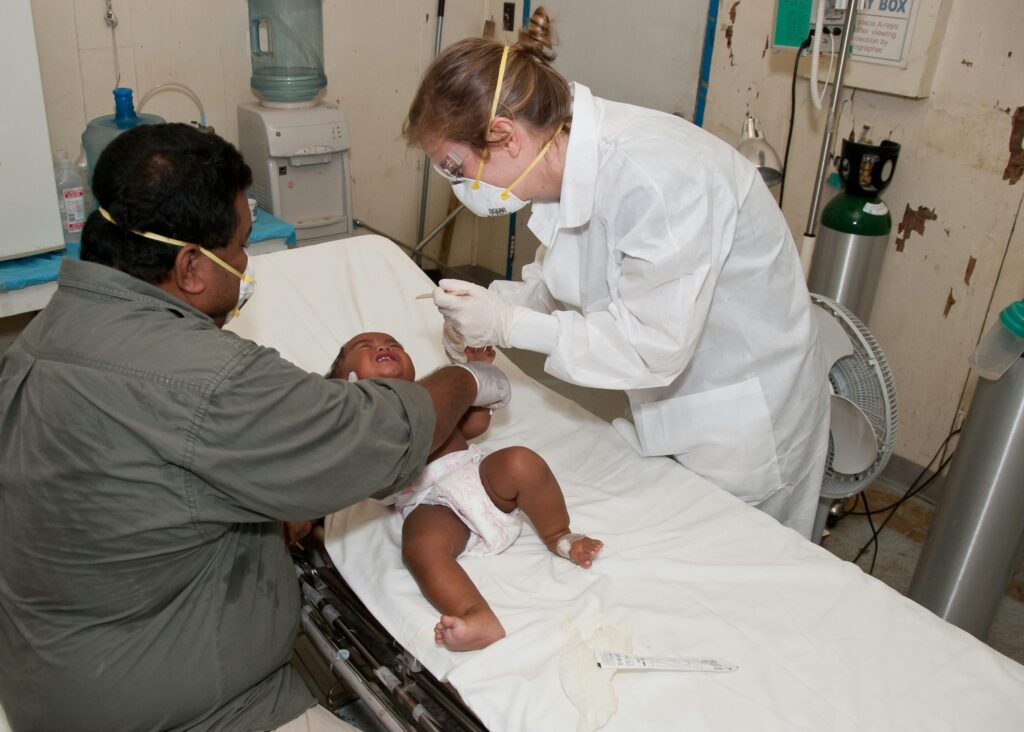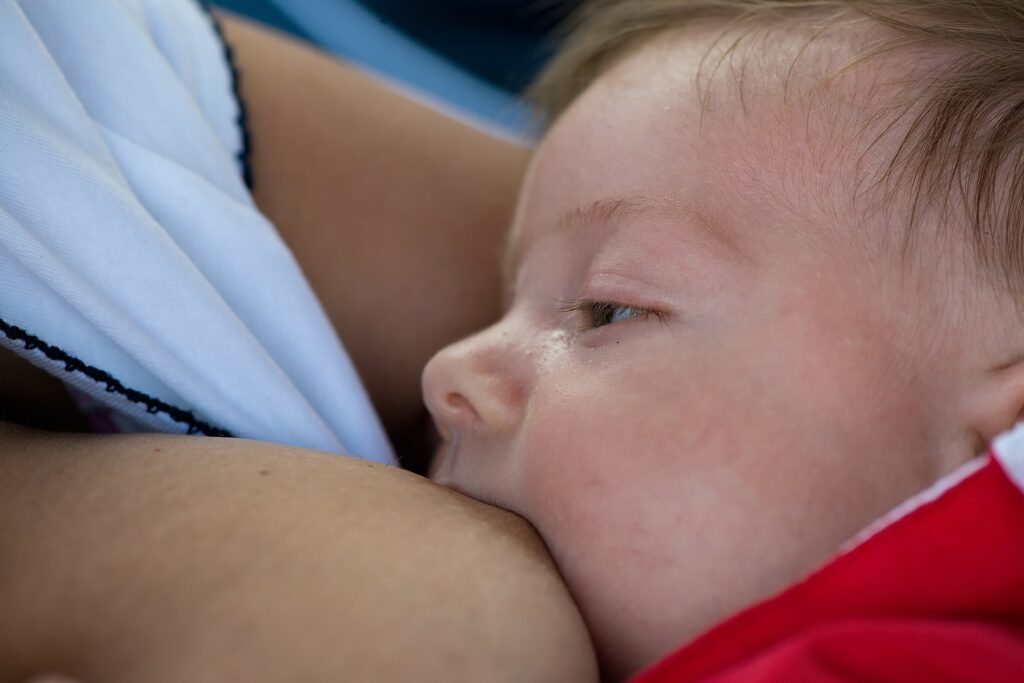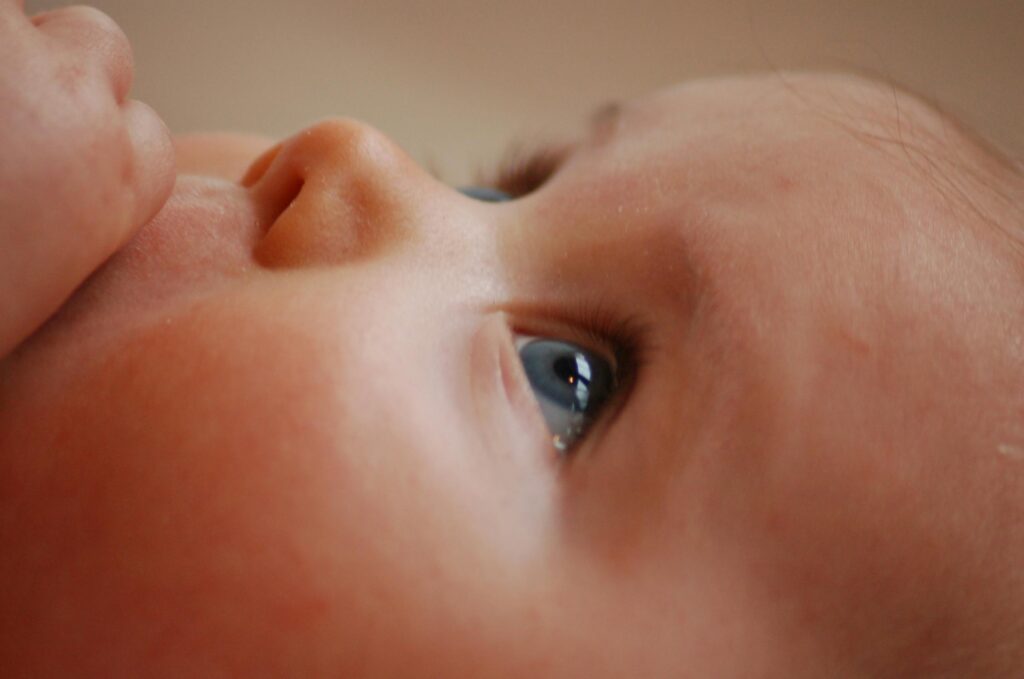Diarrhea, often known as loose motion, is a frequent newborn problem that can worry parents a great deal. Even though it’s usually a mild illness, if left untreated, it can result in malnourishment and dehydration. This handbook offers a thorough explanation of the reasons, signs, and practical treatments for treating newborns’ loose movements.
Comprehending Unsteadiness in Infants
Understanding Loose Motion in Babies
Frequent passing of watery or loose feces is referred to as loose motion. It usually manifests in babies as more frequent bowel movements, frequently coupled with a change in the consistency of the stool. Loose motion is different from regular bowel motions in that it is usually more frequent and watery, which can cause dehydration if left untreated. The intensity of it can vary, from a slight increase in bowel motions to really severe diarrhea that may be fatal. It is crucial to keep a careful eye on the infant’s condition and to consult a doctor if there are any indications of serious dehydration or other issues.
What is Loose Motion?
Loose motion refers to the frequent passage of watery or loose stools. In infants, it is typically characterized by an increased frequency of bowel movements, often accompanied by a change in stool consistency. Unlike normal bowel movements, loose motion tends to be more frequent and waterier, which can lead to dehydration if not addressed promptly. It can vary in severity, ranging from a mild increase in bowel movements to severe diarrhea that can be life-threatening. It is essential to monitor the baby’s condition closely and seek medical advice if there are any signs of severe dehydration or other complications.

Causes of Loose Motion in Babies
Babies’ loose motion can be caused by a number of things, and knowing these causes can aid with efficient management and prevention of the problem.
Infections
The main reason is infections, and common culprits include Salmonella, Shigella, Campylobacter, and Escherichia coli (E. coli). These diseases, which can result in severe diarrhea, can be brought on by tainted food or drink. Infant diarrhea is also frequently caused by viral illnesses such as rotavirus, norovirus, and adenovirus; rotavirus is particularly well-known for its ability to severely dehydrate victims. Loose motion can also be brought on by parasitic illnesses such as Giardia lamblia and Cryptosporidium, which are usually acquired by tainted food or drink.
Nutritional Adjustments
Changes in diet may also cause loose movements. Babies’ digestive systems require time to adjust as they go from breast milk or formula to solid foods, and introducing new foods too soon might result in loose motion. Furthermore, some infants may get diarrhea due to food sensitivities or intolerances. Soy, cow’s milk, and specific fruits and vegetables are common triggers.
Intolerances and Food Allergies
Another reason is food intolerances and allergies. One of the most prevalent food allergies in babies, cow’s milk protein allergy causes symptoms like vomiting, diarrhea, and stomach pain. Due to a deficiency of the enzyme lactase, which is necessary to break down lactose, the sugar contained in milk, lactose intolerance can also result in bloating, gas, and diarrhea.
Antibiotics
Antibiotic-associated diarrhea can happen during or after an antibiotic course because medications might upset the normal balance of good and bad bacteria in the stomach.
Teething
Although teething does not directly cause diarrhea, it can cause increased salivation and a propensity to chew on items, which can cause the digestive tract to become infected with bacteria and result in loose stools.
Additional Health Issues
Chronic diarrhea can also be a symptom of other medical disorders such Crohn’s disease, ulcerative colitis, and celiac disease, an autoimmune ailment where eating gluten damages the small intestine. Because of inadequate food absorption, cystic fibrosis, a genetic condition affecting the lungs and digestive system, can also cause chronic diarrhea.

Symptoms of Loose Motion
Frequent passing of watery stools is the main sign of loose motion, but there are a number of additional symptoms that can also be present, such as cramping or pain in the abdomen, bloating, vomiting, fever, dehydration, irritability, and fussiness. Infants may wail or bring their legs up to their stomachs as a way of expressing discomfort or pain in their belly. Due to the buildup of gas and fluid, their abdomen may feel firm to the touch or appear enlarged. Along with diarrhea, some babies may also have nausea and vomiting, which can exacerbate dehydration. Diarrhea-causing infections can also be accompanied by a low to high fever. Lethargy, dry mouth, sunken eyes, decreased urine output, and decreased urine output are symptoms of dehydration. Severe dehydration is a medical emergency. Due to discomfort and dehydration, the baby could be fussier and more irritable than usual. Severe or persistent diarrhea can also cause weight loss and stunting in the infant.
When to Consult a Physician
While the majority of infant cases of loose motion go away on their own, if the baby shows any symptoms of severe dehydration, such as lethargy, dry mouth, sunken eyes, or no urine production for several hours, then medical assistance is required. A severe infection that requires medical attention may be indicated by a persistently high fever (over 100.4°F or 38°C). Blood or mucus in the feces may be a sign of a bacterial infection or other dangerous illnesses that need to be checked out by a doctor. Diarrhea-related vomiting can quickly result in dehydration and necessitates immediate medical intervention. To rule out underlying illnesses, it’s imperative to see a doctor if the diarrhea lasts longer than two to three days. Unexpected weight gain or noticeable weight reduction is also reason for concern and should be evaluated by a doctor.
Home Treatments and Remedies
Drink plenty of water
Making sure babies stay hydrated is one of the most important parts of regulating their loose motion. The biggest concern that comes with diarrhea is dehydration, which can happen quickly in babies. Oral rehydration solution (ORS) is available over-the-counter and is intended to replenish lost fluids and electrolytes. The baby should be given tiny sips of it periodically, and it should be prepared as directed on the container. If the infant is being breastfed, keep doing so while taking ORS. Antibodies and vital nutrients from breastfeeding support infection prevention and proper hydration. Small amounts of clear fluids, such as coconut water, diluted apple juice, or homemade soups, can be administered to newborns older than six months. However, as they might exacerbate dehydration, sugar-filled beverages, sodas, and caffeinated beverages must to be avoided.
Dietary Modifications
A baby’s diet can be changed to better control loose motion. It is advantageous to introduce foods that are quickly digested and can help firm up the stools. For older infants who have started solids, the BRAT diet—Bananas, Rice, Applesauce, and Toast—is frequently advised. These foods aid in firming stools, are bland, and have little fiber. In addition to providing potassium, an important electrolyte, bananas are high in pectin, which aids in the absorption of liquid in the intestines and bulks up the stool. While applesauce includes pectin and is soft on the stomach, plain white rice is easy to digest and aids in the binding of stools. An overabundance of fluid in the intestines can be absorbed by eating plain toast without butter or toppings. Foods like yogurt (containing live cultures) and probiotic pills can help restore the normal balance of bacteria in the gut. However, before giving a newborn any probiotic supplements, always get advice from a pediatrician. Foods heavy in sugar, fat, and dairy products (apart from breast milk or formula) should be avoided as they can make diarrhea worse. Don’t give out fruit juices or fizzy beverages either.
Organic Solutions
Numerous home cures can ease the digestive tract and lessen the frequency of bowel motions. These treatments ought to be used with caution and under a doctor’s supervision. Applesauce has pectin and is gentle on the stomach, but bananas are high in pectin and aid in firming stools. Cooked rice water has the ability to calm the digestive tract and lessen the frequency of bowel motions. To serve, bring rice to a boil with extra water, drain, and then serve to the baby when it cools. Because of its anti-inflammatory qualities, ginger, either in the form of ginger water or a little amount of ginger juice, can help relieve irritation in the digestive tract. You should, however, always get medical advice before administering ginger to a baby.
Over-the-Counter Drugs
To treat loose motion, a pediatrician could occasionally suggest over-the-counter drugs. Before giving any medication to a baby, it’s imperative to speak with a healthcare provider because some drugs may not be appropriate for young children. While antidiarrheal drugs are generally not advised for newborns and young children, a doctor may prescribe some drugs in rare situations. The World Health Organization advises children with diarrhea, especially those in impoverished nations, to take zinc supplements since they can help lessen the length and severity of the illness.

Stopping Uncontrolled Motion
It is usually preferable to prevent loose motion than to treat it. Maintaining good cleanliness is essential to avoiding diseases that lead to diarrhea. Hands should be completely cleaned after changing diapers, before handling the infant, and before making food. Make sure all of the baby’s pacifiers, feeding bottles, and cutlery are thoroughly cleaned and sterilized. Following the advised immunization schedule is crucial, as the rotavirus vaccine is very useful in preventing rotavirus diarrhea, which is one of the main causes of severe diarrhea in young children. Make sure the water the infant drinks is safe and clean; if the water’s quality is in doubt, boil it or use bottled water. One major source of illnesses that cause diarrhea is contaminated water. In order to monitor any negative reactions, introduce new foods gradually and one at a time. This will let the baby’s digestive system adjust and lower the chance of diarrhea.
When Unsteadiness Turns Into a Chronic
It is imperative to look into a baby’s condition further if they have diarrhea on a regular or consistent basis. Prolonged diarrhea may be a sign of more serious conditions including inflammatory bowel diseases like Crohn’s disease and ulcerative colitis, hereditary disorders like cystic fibrosis, or malabsorption syndromes like celiac disease or lactose intolerance. Medical supervision and particular dietary adjustments are necessary for these conditions. To find the cause of chronic diarrhea, a pediatrician may suggest a range of diagnostic tests, such as blood tests to check for signs of infection, inflammation, and nutritional deficiencies, allergy tests to identify any food allergies or intolerances, and, in more severe cases, endoscopy/colonoscopy to examine the digestive tract. Stool tests are also useful for checking for infections, parasites, and blood. Depending on the underlying cause, treatment options include dietary changes, medication, and in certain situations, surgery. It is essential to collaborate closely with a pediatrician and maybe a gastroenterologist in order to appropriately manage persistent diarrhea.
Diagnostic Tests
In order to identify the cause of persistent diarrhea, a pediatrician may suggest a number of diagnostic procedures, such as:
Stool tests: To look for blood, parasites, and illnesses. Stool tests can also be used to detect problems with malabsorption by determining whether any nutrients are left undigested.
Blood tests: To check for indicators of inflammation, infection, and malnutrition. Blood testing can help discover underlying issues and provide vital information about the baby’s general health.
Allergy testing: To determine whether dietary intolerances or allergies are to blame for any persistent diarrhea. By using these tests, the baby’s diet can be customized to exclude trigger foods.
Endoscopy and colonoscopy: These procedures may be required to check the digestive tract in severe situations. They can aid in the diagnosis of diseases like IBD and offer a clear image of the digestive system.
Treatment for Chronic Diarrhea
Therapy is based on the underlying reason. It could entail changing one’s diet, taking medicine, or in extreme situations, surgery. It is essential to collaborate closely with a pediatrician and maybe a gastroenterologist in order to appropriately manage persistent diarrhea.
Dietary Modifications: It’s critical to adjust the baby’s diet to include easily digested, nutrient-rich foods while avoiding trigger foods.
Medication: Anti-inflammatory meds, antibiotics, and/or vitamins may be administered, depending on the diagnosis.
Surgery: To treat anatomical problems with the digestive tract, surgery may be required in certain circumstances.

The Role of Breastfeeding
Breastfeeding is essential for preventing and treating newborns’ loose mobility. Antibodies found in breast milk support a healthy gut flora and aid in the fight against infections. The World Health Organization advises nursing exclusively for the first six months of life and continuing to do so for at least two years of age, while supplementing with appropriate foods.
Advantages of Breastfeeding
Antibodies: An abundance of antibodies found in breast milk helps ward against infections, particularly diarrhea-causing ones. The infant’s immune system is fortified and given protection from infections thanks to these antibodies.
Easily Digestible: Babies find it easy to process breast milk, which lowers their chance of experiencing digestive problems. It is especially designed to satisfy baby’s nutritional requirements while being kind to their developing digestive systems.
Hydration: Breast milk keeps you hydrated by providing the right amount of nutrients and fluids. It has the ideal ratio of fat, protein, and water to keep the infant full and hydrated.
Probiotics: The good bacteria in breast milk help maintain intestinal health. Proper digestion and prevention of diarrhea depend on a balanced gut flora, which is something that these probiotics assist in maintaining.
Parental Emotional Support
It might be difficult for parents to care for a child who has restricted movement. It’s critical to:
Remain Calm: Infants can sense their parents’ nervousness, which can make them feel even more distressed. Remaining collected and quiet aids in reassuring the infant and eases their worry.
Seek Support: Ask for guidance and assistance from friends, family, or support groups. Talking to other parents about their experiences might offer insightful advice and emotional support.
Look after Yourself: Make sure you are receiving enough sleep, a healthy diet, and emotional support. In order to give your infant the greatest care possible, you must attend to your own health.

Infantile loose motion is a frequent but treatable problem. Parents can ensure their infant recovers quickly by providing the required care by being aware of the causes, symptoms, and efficient solutions. Important measures in controlling this condition include keeping yourself clean, drinking enough water, and getting medical attention when needed. Most cases of loose motion can be rapidly cured with the correct care, patience, and strategy, enabling the infant and parents to resume their regular activities.


